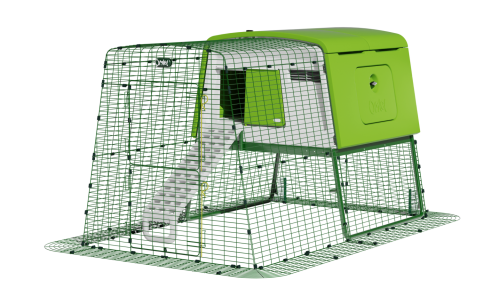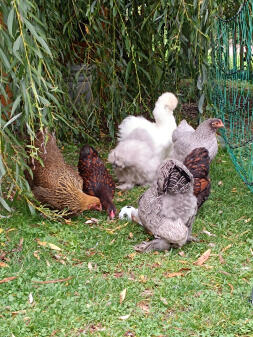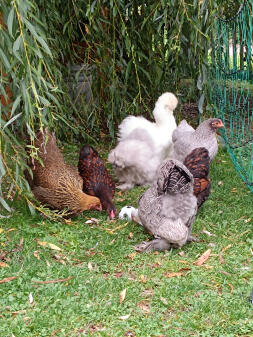
Enjoy bonding time with your flock thanks to Omlet’s range of chicken coops.
Chickens might not be commonly associated with lap pets, but with some effort and patience, you may be surprised by just how tame your hens can be. The internet offers plenty of videos and photos of chickens cuddling with their owners, coming when they’re called, or napping in their arms. But these bonds don’t happen by accident. We’ll share our top tips for how to tame your chickens so that you can build a lasting and memorable relationship with them.
Let your flock adjust
Your chickens will need to adjust when they first join your family. Whether you’ve raised chicks in a brooder, or are adding grown hens – their first few days in a new chicken coop and run can be a lot to take in. Give new chickens at least a week to adjust to their new environment before attempting to start winning over their hearts. Hens who feel safe and comfortable will be much more receptive to your taming efforts.
One hen at a time
It’s usually best to concentrate your efforts on one hen, rather than the entire flock all at once. Your flock will likely have at least one hen bold enough to approach you in search of food. By winning over one hen, the rest of the flock will see you as a friend instead of foe. Work your way through your hens from boldest to meekest to help bolster both your and your flock’s confidence along the way.
Getting your hens used to human touch
The next step in taming your flock is to get your hens to accept human touch. Chickens are prey animals by nature, so they are hardwired to be nervous and flighty in unfamiliar situations. Human touch isn’t natural for hens, so it takes a little time and patience to ease into being able to handle them.
Hand feeding
Ease into taming your chickens by offering them treats by hand. Kitchen scraps like fruit peelings or fresh greens are great for hand-feeding because they’re long and sturdy. You can also put scratch grains, dried mealworms or black soldier fly larvae in your palm to offer by hand, but your chickens will have to venture closer to sneak a bite.
Always get on your hens’ level when feeding them by hand. Crouch down if they’re on the ground, or wait until they are about chest-level with you on a chicken perch before showing them your offering. Don’t be offended if they turn their beaks up at first – after several sessions, they’ll catch on that you’re offering food.
Inviting them for a sit
Once your hens are eating from your hand, sit on the ground or in a low chair with your legs outstretched. Offer them treats as usual, but this time move your hand toward your lap while they’re eating. Encourage them to hop onto your legs. This is a big ask for a chicken, so be patient and don’t be discouraged if it takes several days before they attempt to sit with you.
When your hens are hopping into your lap, gently pet them or hold them loosely so that they feel secure. Don’t grab at them or force them to stay with you, or it may shake the confidence you’ve worked hard to build.
Sitting with you is a sign that your hens trust you and are comfortable around you. After they’ve become accustomed to hopping into your lap, you can move on to encouraging them to follow you around the run or yard, or to allow you to pick them up.
Picking chickens up
Handling your chickens should only be done if they’re willing or you absolutely have to. Performing health checks on your chickens is one situation where you’ll need to catch and hold them, so building a bond based on trust beforehand will make picking them up much easier.
Never chase your chickens in an effort to catch them. This will trigger their flight response, as is common with all prey animals. The easiest and least stressful way to catch a chicken is to invite them to sit with you as you have trained them to. Once they’re in your lap, gently wrap an arm over both of their wings to prevent them from flapping and injuring themselves. Hold them securely to your body before standing up. If you need to maneuver them, hold them with both hands, still covering both of their wings, but always carry them close to your body. Tucking your chickens under one of your arms to carry them is the most comfortable way for hens to be held.
Handling chicks
Chicks that are handled from an early age are often the easiest to tame as they mature. Don’t attempt to handle chicks that are under 3 days old, as they are still learning to eat and drink, making this a very vulnerable stage. Once you are sure your chicks are thriving, try to handle them at least once or twice a day, for just a couple of minutes each time. As with adult hens, make sure to hold their wings down against their sides to prevent flapping and possible injury.
Which breeds are the easiest to tame?
Every individual hen is different, but there are some breeds that are known for their friendly and tame dispositions. These include:
These breeds don’t guarantee tame hens, but they are genetically predisposed to being calm and trusting of humans. You’ll still need to put in the work to win the trust and fully tame chickens of any breed.
Why are my chickens not tame?
Some hens will always remain standoffish, despite your best efforts. These chickens may never be trusting enough to be picked up or pet, but even the most aloof members of your flock will soon recognize you as their protector and bringer of tasty treats. You can still have a bond with chickens that don’t want to be held by focusing on other interactions like coming when the flock is called, or tossing them treats to watch them eagerly give chase.
Omlet and your flock
Keeping your flock safe and happy creates an environment for peaceful interactions. With a safe chicken coop, sturdy chicken run, and fortifying features like an automatic chicken coop door, you’ll win your hens’ hearts over by speaking their love language: safety. When your flock feels secure, they’ll have the confidence they need to forge a bond with their keepers.













Comments
Nicole, 11 July 2021
Hi someone gave us a chicken I have no idea how old it is or if it had been tamed I want to keep it as a backyard chicken but I don’t know if it was tamed my parents want to kill and eat it but I wanna give her a chance. Any advice?
Simone, 22 March 2020
Getting ready to take the leap to get some backyard chickens...:)))
Roberta, 26 July 2019
I am confused, my first chicks would scream when I picked them up (they were about a week old when I got them)I so much wanted to pick them up and pet them but they were to scared, I did not want to force it, when I could finally put them in the pen, they were still very skittish of me, so I would offer food from my hand as I sat in a chair and hang it on the side, eventually they ate from my hand over a week or two I would raise my hand up a bit and they would be confused, but they would follow my hand and jump in my lap, and I would feed them that way eventually I started to just feed them in my lap with the food all over my belly and legs, now they jump up follow me around and I dont always have food but they still do so, I am thinking if I had forced them to be handled against their will/fear that would make their fear more intense as I have taken over control of their flight ability and that would make them more fearful you think? now I have 13 day old chicks I got as one day old and they are terrified of me, if I reach in to change the water they flee and cry and when I add food to the feeder they freak out, when I clean the pen out they act like I am a hawk or something. I had to handle them because of pasty butt, but I am afraid if I force interaction it would only intensify their fears instead of reduce it because they are being forced and the bird has no option otherwise and that would intensify their fears? so I am confused as to what to do to ease their fears rather than intensify it any suggestions?
Marie, 7 February 2019
I've had my layers since 10 days old. They are RIR x leghorn 9 weeks old. I've had them in the house every day for a few hours, and when we watch TV they fight for the spot under my neck. During the day though they don't want to be handled or petted at all, and act like they are scared of me. They will come if I have a treat but not otherwise. If anything they are less tame than they were at 6 weeks. I know they are not known as one of the friendly breeds, but I would like them to enjoy cuddles. Is there anything I can do/ thanks
Sonia, 18 October 2018
I have had some chicken whom are about 17 weeks old. I am currently feeding them both 50/50 growers pellets and layers mash. I have been told not to feed them treats until they are laying eggs - is this true? I have some sweetcorn which i was going to feed them - should i give them sweetcorn also?